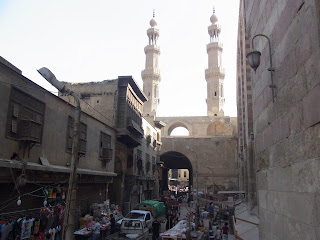
My two-week visit to this city of scramble and survival began here. Blogwise, it ends on this page. Given that it was Ramadan, I'm not certain I got a representative look at Cairo, but I believe the following tips and observations can be of use to anyone planning a visit.
1. Ignoring any unsolicited suggestions that you do something is good policy anywhere, even in your hometown, but 100 times more important in Cairo. Seemingly helpful offers to see a hidden or old treasure invariably lead you to a feature that is neither hidden nor old, and is followed by a request for a "tipsy." If you're offered a cab, decline and find your own. For the most pleasant experience here, make sure all your decisions are self-directed. Can't stress this enough.
2. Green laser pointers, like fireworks, are a fairly new craze (post-2011). They used to scare me because I'd seen how they were used during violent confrontations to identify and blind one's opponents. But they're overwhelmingly wielded as a playful toy.
3. The air quality is the best of any big city I've visited. Better than Denver, Phoenix, Los Angeles, Seoul. It was a revelation to learn how much natural gas Egypt produces and uses in its vehicles. There is nothing particularly "green" about this country, but seeing the viability of CNG as everyday vehicle fuel, and not just on municipal buses and the like, is something the U.S. can learn from.
4. Walking in traffic is a necessary skill. Forget about the sidewalks: They're broken, have no cutouts (some of the curbs are so tall, you practically have to put your hand on the ground to descend from them), are blocked by vendors and are prime spots to be rained on by air conditioners. Virtually every vehicle approaching from behind will honk at you. Don't take it personally. The penalties for hitting a pedestrian are practically life-ending for motorists, so as aggressive as they seem, they are more afraid of you than you may be of them.
5. There are no traffic signals outside of downtown. No red or green lights, no yield or stop signs.
6. Crossing the street is an art form. If you wait for traffic to clear, you'll never get to the other side. Some newcomers have been known to hail a cab just to be able to traverse that scary 40 feet. My technique is to walk in the direction of oncoming traffic, which gives me the momentum I need to make a sharp 90-degree angle behind the rear bumper of the car that's just passed. Repeat as needed. Panic is not recommended; the more relaxed you are, the safer. Running is cheating. My landlord's mother, from Germany, became so addicted to this activity she'd spend 45 minutes at a time crossing and re-crossing the same street.
7. Drinking water in public during Ramadan is fine. I was concerned about this before arriving, but nobody seems to care. In fact, the observant believe this strengthens their faith. There's even an Arabic word for it. Outside of Cairo, which I've found to be quite liberal, the public response may not be so blase. Tap water is safe but heavily chlorinated. Nothing beats a cold bottle of Bakara (a Nestle product).
8. The cabs with the black-and-white checks on the side are the least cheaty. If you're a woman, think twice about sitting in the front seat. You can negotiate a price ahead of time, but I've never found the need, settling instead on a pound-per-minute system. So that 50-minute ride to the airport should cost no more than 50 pounds, or about seven U.S. dollars. If a cabbie doesn't seem satisfied, it's a game. Just pay and walk away.
9. Finding beer during Ramadan. I haven't bothered buying any because it's a pain in the ass, but it can be done. There's the corner store in Zamalek that I referenced here. The Massoud Supermarket, at the corner of Street 72 and Street 9 in Maadi carries it, but that's quite a hike from the city center. The souvenir shops in Coptic Cairo always have a few cans in their coolers. The Four Seasons, Mena House, Kempinski and other 5-star hotels will pour them, but during the holy month you'll need to bring your passport, because they won't serve Egyptians. In a 48-hour window after your arrival, the duty-free shop downstairs at Terminal 3 will sell a certain amount of beer and liquor, as will the duty-free shops on Talaat Harb (northeast of Tahrir Square), Gamiat Ed Duwal in Giza, and in Nasr City's City Stars mall.
10. Pat-downs are a way of life. Entering many historical sites, or any mall, museum or fancy hotel, you'll have to go through a metal detector, followed by a wanding and/or full-on molest. Too bad some of this security zeal is not directed toward the lawless mess that is Pyramids Road.
Many thanks to Martin W., who modestly insists on a better life.
End












